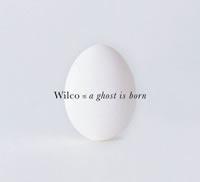Rhino does Wilco's Grammy Award Winner on double 180g Vinyl
When Quantegy, the last analog tape manufacturer, went into bankruptcy late last year, Wilco's Jeff Tweedy was quoted in a Wall Street Journal story saying something to the effect that the tape upon which his albums are recorded may become worth more than the recordings themselves and that the tape may have to be recycled so the group could continue recording.
Fortunately, Quantegy's financial problems were not related to a slowdown in demand for analog tape. In fact that side of its business was a profit-maker and new owners have put analog tape back into production, meaning Wilco will not have to erase its masters and reuse them. Good thing!
You can bet this set recorded at the tubey/vintage/retro Sear Sound in NYC was done all-analog, though the source used for this double LP is not disclosed on the packaging.
A Ghost is Born is a meandering set, not nearly as coherent or satisfying as Yankee Hotel Foxtrot, yet it still has its charms. Sufficient time has passed since it was first issued on CD to digest the early reviews and wonder what the boosters and the detractors were hearing. It's not nearly as good as advertised, nor as bad.
Too many songs begin with a promise only to drift off into unstructured, crunchy instrumental anarchy.
Tweedy's lyrics are often impenetrable-or at least not sufficiently intriguing to try to decipher, though he was coming off of an addiction to pain killers and knowing that helps (I think) explain some of the imagery in songs like “Hell Is Chrome,” and “Spiders (Kidsmoke).”
The mopey opener sets a nice mood but then suddenly turns into a sledgehammer attack of electric guitar feedback that sounds like something off of Weld. It's nice, but not a satisfying way to end the tune-at least for the listener. Tweedy definitely got off.
The same thing happens on “Spiders (Kidsmoke),” which starts out promising and dissolves into a feedback drenched “raga-rock”-like noise attack. Fun for Tweedy, less so for us. Perhaps it works better live.
Side two is one of the set's best, starting with the folky, delicate “Muzzle of Bees,” continuing with the Beatlesque “Hummingbird,” (complete with Ringo drum fill) and ending with the evocative and poetic but decipherable “Handshake Drugs,” a song that concentrates Wilco's strongest suits. The song's got a charming melody, an infectious beat, and the personal touch that has created the latest crowd around the band.
Side 3's elegant “Company in My Back,” is another of the uneven set's highlights, but that's followed by the aimless “rocker” “I'm a Wheel,” which rolls nowhere in particular. The tightly assembled “Theologians” ends the side in satisfying fashion, echoing '70s rock from Squeeze or some other bands of that era I can't call up.
Side 4's opener, the delicate, spare song of deliverance “Less Than You Think,” is another of the set's strongest tunes-at least it starts out that way, only to descend after 3 delicious minutes into a purposeless ambient noise fest of underwater boat dock sound effects and sonar.
“The Late Greats,” a “long may they wave” rock and roll tribute to the “failed many” salvages the album's ending with a gracious message of support and humility.
Overall then, an album that's neither as good as its supporters would have you believe, nor as bad as the detractors claim.
The recording is wonderful, as you might expect if you know anything about Walter Sear's studio filled with vintage analog gear. It's a template for what a modern rock album should sound like.
The vinyl vs. CD comparison demonstrates just how much is lost translating a great analog recording to CD. I write “CD” and not “digital,” because I don't know the source of the vinyl. Often a professional high rez A/D conversion cut to vinyl will trounce the CD version, but I'm hoping the analog master, if there was one, was used to cut the vinyl because the difference between it and the CD is vast. The CD sounds congealed, thick, lifeless and indistinct. The double LP sounds open, clear, organized and organic. There's a huge disparity-especially in terms of transient response. The LP is fast, the CD slow.
Unfortunately, the copy I bought of this RTI pressed double set was terribly noisy and no amount of cleaning cured it, though it did make it at least tolerable. Judging my experiences with RTI pressings of late, and comments received from musicangle readers, QC at RTI is sufferering. I hope they get back to where they once belonged.



